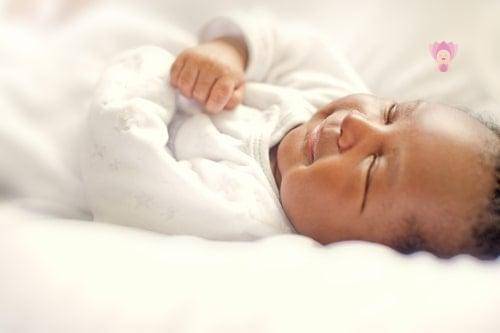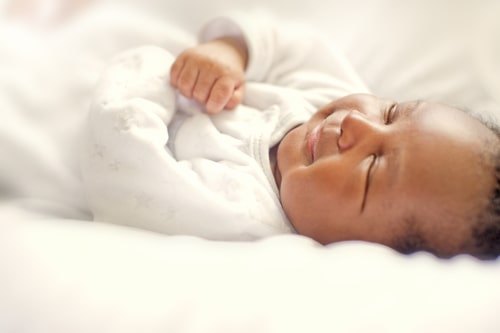Naps help babies learn and remember

Naps help babies learn and remember. In fact, babies may require timely naps to transfer new information and skills into long-term memory. Does this mean we should be forcing our babies to take lots of naps? No. But we should treat naps with respect…and realize that the last hour (or so) before sleep is prime time for learning.

You may have heard that sleep improves memory. Adults and children retain more from their lessons if they take naps shortly after learning new facts or skills (Jones and Spencer 2020).
But what about babies? Do babies experience similar benefits? Experiments provide us with compelling evidence: Naps help babies learn and remember.
To see what I mean, consider an experiment on 6-month-old and 12-month-old infants. Sabine Seehagen and her colleagues wanted to know if napping could help these babies transform an interesting, real-life event into a lasting memory. So the researchers visited each infant in his or her own home, and presented the baby with a live puppet show. It went like this.
An adult puppeteer knelt in front of the infant, and did three things:
- First, the puppeteer removed a mitten from the puppet’s hand.
- Next, she shook the mitten up and down, which caused a small bell inside to tinkle.
- Last, the puppeteer replaced the mitten on the puppet’s hand.
The researchers wanted to make sure the babies absorbed the information in this sequence, so they had the puppeteer repeat the show multiple times. The younger infants watched the sequence 6 times in a row. The 12 months watched it 3 times. Then the puppet was removed from view.
Four hours later, the babies were presented with the puppet to play with, and their behavior was recorded. Did they show signs of having remembered the earlier session? Did they imitate any of the actions they’d seen the puppeteer demonstrate? Babies tend to imitate what they see us do…so if they learned from the puppet show – and remembered the details – the researchers expected that the babies would remove the mitten and investigate it, just the way the puppeteer had done hours before.
As it turned out, some babies did learn and remember. But it depended on the timing of their naps.
Half of the babies had been randomly assigned to watch the puppet show after they’d awakened from a habitual nap. These babies were well-rested, so of course they didn’t nap again for quite a while – on average, about 130 minutes after the puppet show.
The other half? They had been assigned to watch the puppet show before their regularly-scheduled naptime. On average, these infants fell asleep approximately 45 minutes after seeing the show.
So – when it came to falling asleep after the puppet show — there was a pretty substantial difference between groups. The first group – let’s call them the “delayed nappers” – stayed awake nearly 90 minutes longer (on average) than the “prompt nappers” did. And it looks like that difference in post-show napping had a pretty big impact.
Because – at test time — the only babies who showed evidence of having retained anything from the puppet show were the prompt nappers. The delayed nappers test performance was indistinguishable from that of a control group who had never seen the puppet show (Seehagen et al 2015).
Could it be that the babies in the delayed nap group were merely tired? Too tired to perform well on the memory test?
That’s a reasonable possibility, because the delayed nappers didn’t just wait longer before falling asleep post-puppet show. They also got less total sleep between the puppet show and the test. Hmmm.
To tackle this question, the researchers recruited another group of families, and ran the experiment again – with a crucial change. Instead of testing the babies 4 hours after the puppet show, they postponed testing until the next day – allowing all the infants to get a good night’s sleep first (Seehagen et al 2015). And what happened?
They got the same results. Only the babies who’d napped promptly after learning showed signs of long-term retention.
It seems, then, that this really is about the power of a post-learning nap. And it’s particularly interesting if you consider that the “prompt nappers” in these experiments would have had the most reason to feel tired when they were learning about the puppet.
After all, they were the ones who had gone the longest without sleep before the puppet show. We might have expected them to have been at a learning disadvantage. But – on the contrary – they were the winners of the memory contest. In the end, it was getting sleep shortly after the lesson that mattered most.
More evidence that naps help babies consolidate new memories
We’ve been focusing on the results of a single study (Seehagen et al 2015). I wanted to show you what researchers do to figure things out – so you can judge for yourself how persuasive this type of experimentation is. But of course we need more than a single study to feel confident about our conclusions, and, in this case, we have lots of additional research to strengthen the case.
For example, the same team has conducted several follow-up studies, and reported the same outcomes: Babies don’t show retention of the puppet show events unless they take a nap (Konrad, Seehagen et al 2016; Konrad, Herbert et al 2016).
Moreover, another, independent lab carried out its own experiment on imitative learning in babies, and they told a similar story: When 9-month-olds were forced to skip their morning nap, they experienced impairments in their ability to remember morning “lessons” (Mason et al 2021).
And it isn’t only imitation-based learning that researchers have investigated. It appears that naps also help babies learn about other things – including faces, language, and problem-solving.
For instance, in an experiment on 3-month-old babies, Klára Horváth and her colleagues discovered these infants were capable of learning about – and remembering – a new, cartoon face. But only if they took a nap after the lesson (Horváth et al 2017).
Other studies report that babies retain memories for newly-encountered words and grammatical patterns – if and only if they nap promptly afterwards (e.g., Gomez et al 2006; Hupbach et al 2009; Horváth et al 2015; Simon et al 2017; Friedrich et al 2022).
And then there’s the work of Sarah Berger and her colleagues – researchers who study the problem-solving abilities of infants as they crawl, clamber, and walk. In a series of experiments, Berger and her team have challenged babies with a novel locomotion problem: How to travel through a tunnel to be reunited with their mothers.
When babies take a nap after figuring this out, the lesson sticks. But if they don’t sleep? They show no evidence of remembering the solution later (Berger and Sher 2017; Demasi et al 2021; Horger et al 2023).
Why does napping help infants remember new information and new skills?
We know from experiments on both human adults and nonhuman animals: Something happens during non-REM sleep. The brain periodically experiences little bursts of rhythmic brain waves – called sleep spindles – and these sleep spindles are directly related to memory retention. The more you have, the better you will remember newly-learned facts and skills.
In adults, we start experiencing sleep spindles immediately after passing from the lightest stage of sleep (NREM1) into the somewhat deeper stage known as NREM2. And experiments indicate that naps have the biggest memory-enhancing effects when they are long enough to get us into the NREM2 stage.
Babies? There haven’t been as many studies, but when researchers have measured sleep spindles in infants, they’ve found the same relationship between naps, sleep spindles, and learning. For example, sleep spindle activity has been linked with memory for speech in babies as young as 6 months (Friedrich et al 2022).
How should we use this information?
Researchers caution us from trying to force babies to sleep when they aren’t ready. And these studies definitely aren’t telling us that babies need to increase the total time they spend sleeping during the day. Babies are individuals – each with their own sleep needs – and it’s natural for babies to spend less time napping as they get older.
But what this research does indicate is that naps play a special role in infant learning. Indeed, when two experts in the field — Klára Horváth and Kim Plunkett – reviewed the evidence, they didn’t hedge, saying “We conclude that daytime napping is crucial in early memory development” (Horváth and Plunkett 2018).
So we should take notice, and realize that naps do more than make our babies less cranky. They allow babies to store data in long-term memory. And that last hour or so before sleep? It’s not just a countdown to peace and quiet. It’s a precious time for absorbing new learning — learning that will last.
Learning more about learning…and baby sleep
If you are interested in more of what research tells us about learning in babies, check out these Parenting Science articles:
And if you’re wondering about your baby’s sleep patterns, I recommend this Parenting Science overview.
References: Naps help babies learn
Berger SE, Scher A. 2017. Naps improve new walkers’ locomotor problem solving. J Exp Child Psychol. 162:292-300.
DeMasi A, Horger MN, Allia AM, Scher A, Berger SE. 2021. Nap timing makes a difference: Sleeping sooner rather than later after learning improves infants’ locomotor problem solving. Infant Behav Dev. 65:101652.
Friedrich M, Mölle M, Born J, Friederici AD. 2022. Memory for nonadjacent dependencies in the first year of life and its relation to sleep. Nat Commun. 13(1):7896.
Gomez RL, Bootzin RR, Nadel L. 2006. Naps promote abstraction in language-learning infants. Psychol Sci. 17:670–674.
Horváth K and Plunkett K. 2018. Spotlight on daytime napping during early childhood. Nat Sci Sleep. 10:97-104.
Horváth K, Myers K, Foster R, Plunkett K. 2015. Napping facilitates word learning in early lexical development. J Sleep Res. 24:503–509.
Horváth K, Hannon B, Ujma PP, Gombos F, Plunkett K. 2018. Memory in 3-month-old infants benefits from a short nap. Dev Sci. 21(3):e12587.
Horger MN, DeMasi A, Allia AM, Scher A, Berger SE. 2023. The unique contributions of day and night sleep to infant motor problem solving. J Exp Child Psychol. 226:105536.
Hupbach A, Gomez RL, Bootzin RR, Nadel L. 2009. Nap-dependent learning in infants. Dev Sci. 12:1007–1012.
Jones BJ and Spencer RMC. 2020. Role of Napping for Learning across the Lifespan. Curr Sleep Med Rep. 6(4):290-297.
Konrad C, Herbert JS, Schneider S, Seehagen S. 2016. Gist extraction and sleep in 12-month-old infants. Neurobiol Learn Mem. 134 Pt B:216-20.
Konrad C, Seehagen S, Schneider S, Herbert JS. 2016. Naps promote flexible memory retrieval in 12-month-old infants. Dev Psychobiol. 58(7):866-874.
Mason GM, Kurdziel LBF, Spencer RMC. 2021. The memory benefits of two naps per day during infancy: A pilot investigation. Infant Behav Dev. 65:101647.
Seehagen S, Konrad C, Herbert JS, Schneider S. 2015. Timely sleep facilitates declarative memory consolidation in infants. Proc Natl Acad Sci U S A. 112(5):1625-9.
Simon KNS, Werchan D, Goldstein MR, Sweeney L, Bootzin RR, Nadel L, Gómez RL. 2017. Sleep confers a benefit for retention of statistical language learning in 6.5month old infants. Brain Lang. 167:3-12.
Image of sleeping, smiling infant in white by Tatiana Katsai / shutterstock















